Thyme Travellers An Anthology of Palestinian Speculative Fiction
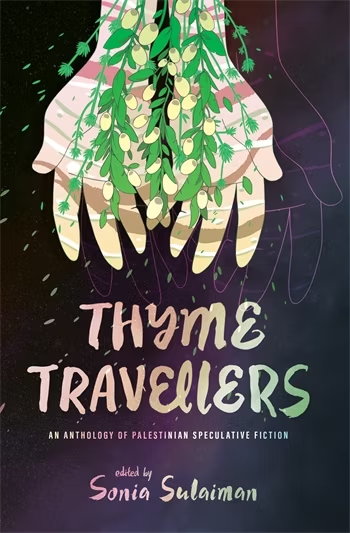
Edited by Sonia Sulaiman
Thyme Travellers collects fourteen of the Palestinian diaspora’s best voices in speculative fiction. Speculative fiction as a genre invites a reconfiguring of reality, and here each story is a portal into realms of history, folklore and futures.
A man stands on the shore waiting to commune with those who live in the ocean. Pilgrims stretch into the distance, passing a stone cairn with a mysterious light streaming from it. Two Australian women fervently dig a tunnel to Jerusalem. Men from Gaza swim in the sea until they drown, still unconcerned. A father and son struggle to connect over the AI scripts prompting their conversation.
Building on the work of trailblazing anthologies such as Reworlding Ramallah and Palestine +100, this volume is the first of its kind in Canada. Editor Sonia Sulaiman brings together stories by speculative fiction veterans and emerging writers from Australia to Egypt, Lebanon to Canada.
Prisons Must Fall
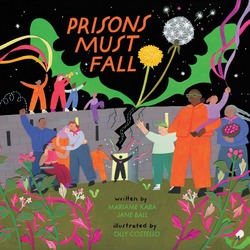
By Mariame Kaba
Illustrated by Olly Costello
Prisons, they do no good.
They do not help.
They do not teach.
On a moonlit road, tucked away from prying eyes, a child sees a prison complex—cinder blocks, watch towers, barbed wire. Page by page, we come to see the prison as a child sees it.
Prisons hurt people and leave them lonely, without loved ones to comfort them or lend a listening ear.
As dandelion stars float up in the air, this dreamscape becomes a hope-scape, where love transcends the prison walls. All the families and friends of the people in the prison march and protest in beautiful song, march together to a new way and a new dawn—in this case a cooperative housing and community center, next to a neighborhood greenhouse for restoration and healing. A new world, where connection and repair are fundamental, and even tangible, as people around a table quilt messages, “I hear you. I’m sorry for what I did. How can I make it better?”
In Prisons Must Fall, Mariame Kaba, a longtime activist, together with co-author Jane Ball, present solutions that do not involve incarceration, such as meeting people’s basic needs, restorative justice, and community support—seeds for a safe world. Illustrator Olly Costello provides textured images of a global majority community and a grey, monotone backdrop that is overtaken by joyful colors. A gentle but effective addition to all social justice bookshelves and libraries. Discussion questions included.
How to be an Antiracist
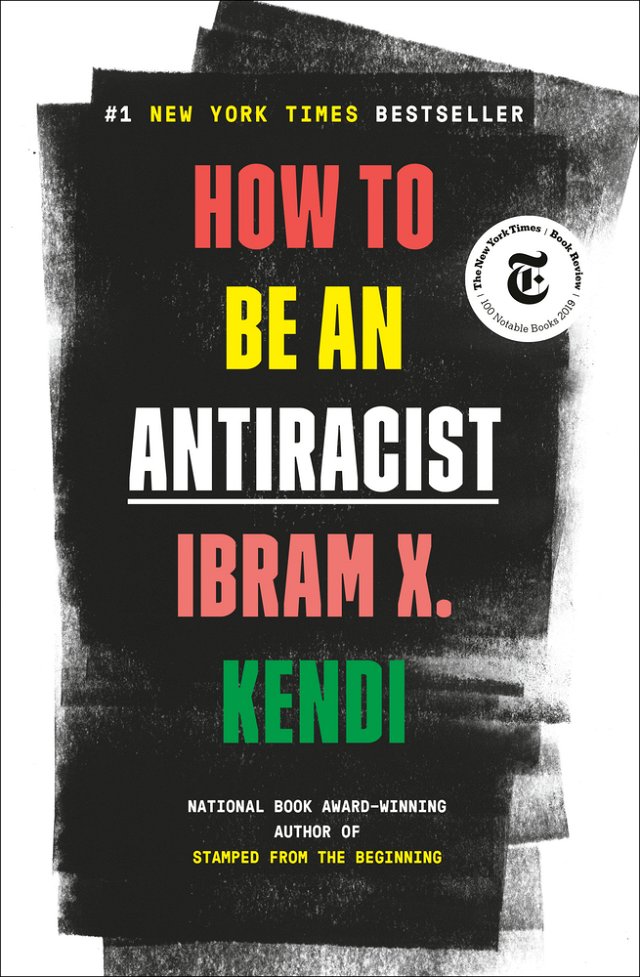
By Ibram X. Kendi
Antiracism is a transformative concept that reorients and reenergizes the conversation about racism—and, even more fundamentally, points us toward liberating new ways of thinking about ourselves and each other. At its core, racism is a powerful system that creates false hierarchies of human value; its warped logic extends beyond race, from the way we regard people of different ethnicities or skin colors to the way we treat people of different sexes, gender identities, and body types. Racism intersects with class and culture and geography and even changes the way we see and value ourselves. In How to Be an Antiracist, Kendi takes readers through a widening circle of antiracist ideas—from the most basic concepts to visionary possibilities—that will help readers see all forms of racism clearly, understand their poisonous consequences, and work to oppose them in our systems and in ourselves.
Kendi weaves an electrifying combination of ethics, history, law, and science with his own personal story of awakening to antiracism. This is an essential work for anyone who wants to go beyond the awareness of racism to the next step: contributing to the formation of a just and equitable society.
Spell Freedom: The Underground Schools That Built the Civil Rights Movement
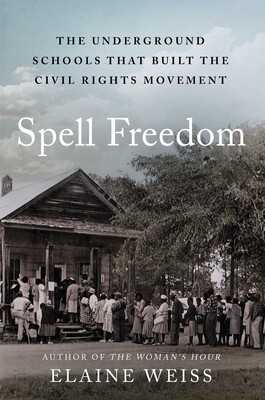
By Elaine Weiss
In the summer of 1954, educator Septima Clark and small businessman Esau Jenkins travelled to rural Tennessee’s Highlander Folk School, an interracial training center for social change founded by Myles Horton, a white southerner with roots in the labor movement. There, the trio united behind a shared mission: preparing Black southerners to pass the daunting Jim Crow era voter registration literacy tests that were designed to disenfranchise them.
Together with beautician-turned-teacher Bernice Robinson, they launched the underground Citizenship Schools project, which began with a single makeshift classroom hidden in the back of a rural grocery store. By the time the Voting Rights Act was signed into law in 1965, the secretive undertaking had established more than nine hundred citizenship schools across the South, preparing tens of thousands of Black citizens to read and write, demand their rights—and vote. Simultaneously, it nurtured a generation of activists—many of them women—trained in community organizing, political citizenship, and tactics of resistance and struggle who became the grassroots foundation of the Civil Rights Movement. Dr. King called Septima Clark, “Mother of the Movement.”
In the vein of Hidden Figures and Devil in the Grove, Spell Freedom is both a riveting, crucially important lens onto our past, and a deeply moving story for our present.
Fire on the Mountain
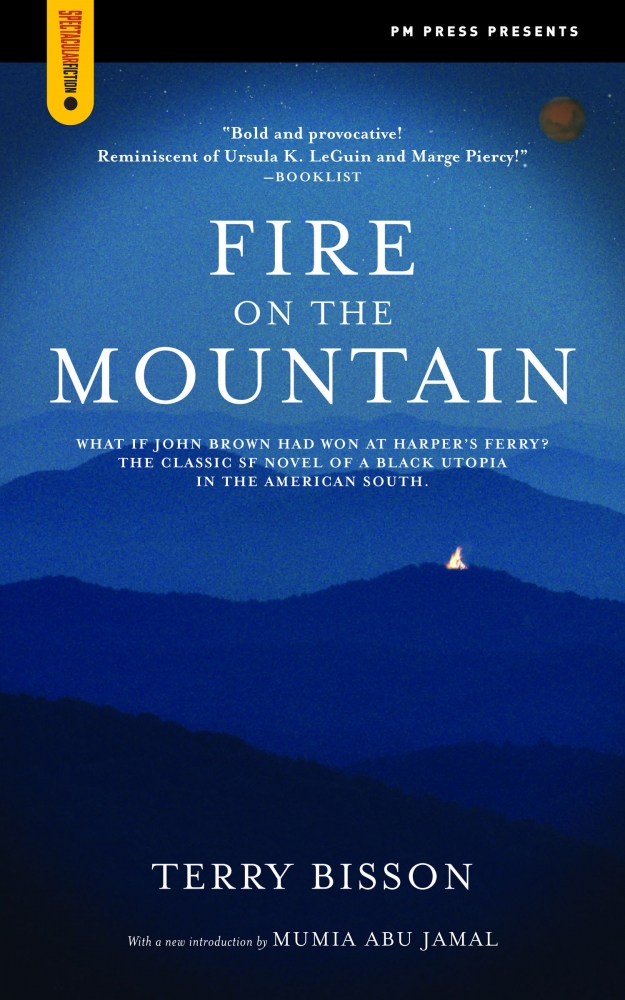
By Terry Bisson
It’s 1959 in socialist Virginia. The Deep South is an independent Black nation called Nova Africa. The second Mars expedition is about to touch down on the red planet. And a pregnant scientist is climbing the Blue Ridge in search of her great-great grandfather, a teenage slave who fought with John Brown and Harriet Tubman’s guerrilla army.
Long unavailable in the U.S., published in France as Nova Africa, Fire on the Mountain is the story of what might have happened if John Brown’s raid on Harper’s Ferry had succeeded—and the Civil War had been started not by the slave owners but the abolitionists.
No Shortcuts: Organizing for Power in the New Gilded Age
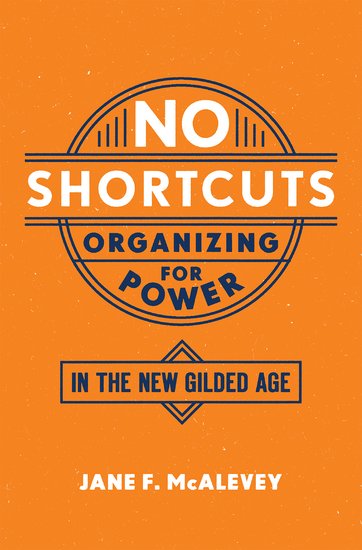
By Jane F. McAlevey
The crisis of the progressive movement is so evident that nothing less than a fundamental rethinking of its basic assumptions is required. Today’s progressives now work for professional organizations more comfortable with the inside game in Washington DC (and capitols throughout the West), where they are outmatched and outspent by corporate interests. Labor unions now focus on the narrowest possible understanding of the interests of their members, and membership continues to decline in lockstep with the narrowing of their goals. Meanwhile, promising movements like Occupy Wall Street and Black Lives Matter lack sufficient power to accomplish meaningful change. Why do progressives in the United States keep losing on so many issues?
In No Shortcuts, Jane McAlevey argues that progressives can win, but lack the organized power to enact significant change, to outlast their bosses in labor fights, and to hold elected leaders accountable. Drawing upon her experience as a scholar and longtime organizer in the student, environmental, and labor movements, McAlevey examines cases from labor unions and social movements to pinpoint the factors that helped them succeed – or fail – to accomplish their intended goals. McAlevey makes a compelling case that the great social movements of previous eras gained their power from mass organizing, a strategy today’s progressives have mostly abandoned in favor of shallow mobilization or advocacy. She ultimately concludes that, in order to win, progressive movements need strong unions built from bottom-up organizing strategies that place the power for change in the hands of workers and ordinary people at the community level.
Beyond the concrete examples in this book, McAlevey’s arguments have direct implications for anyone involved in organizing for social change. Much more than cogent analysis, No Shortcuts explains exactly how progressives can go about rebuilding powerful movements at work, in our communities, and at the ballot box.
Fighting Times: Organizing on the Front Lines of the Class War
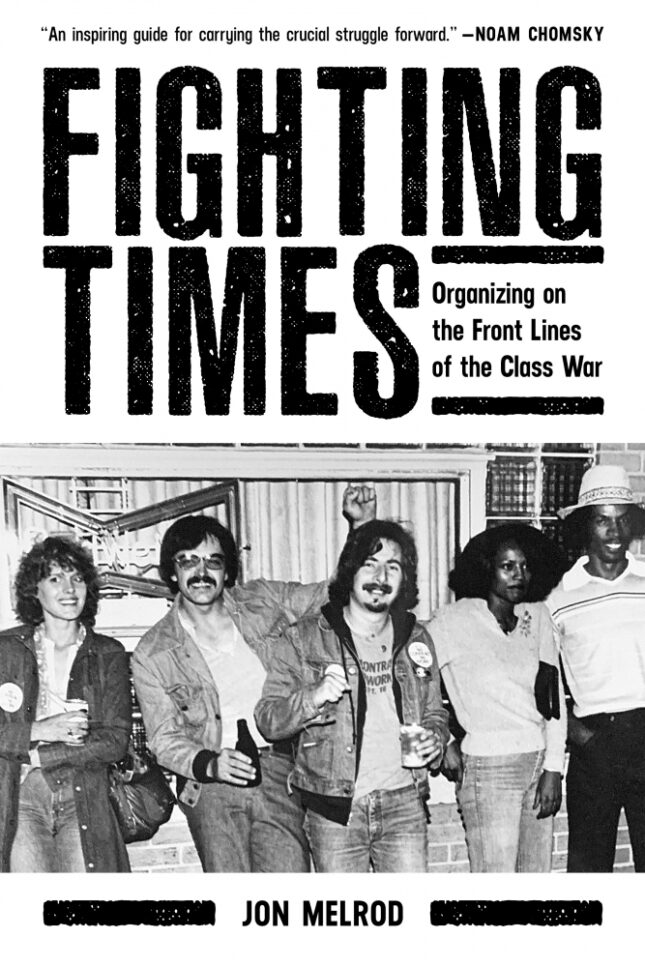
By Jon Melrod
Deeply personal, astutely political, Fighting Times: Organizing on the Front Lines of the Class War recounts the thirteen-year journey of Jon Melrod to harness working-class militancy and jump start a revolution on the shop floor of American Motors. Melrod faces termination, dodges the FBI, outwits collaborators in the UAW, and becomes a central figure in a lawsuit against the rank-and-file newsletter Fighting Times, as he strives to build a class-conscious workers’ movement from the bottom up.
A radical to the core, Melrod was a key part of campus insurrection at the University of Wisconsin, Madison. He left campus for the factory in 1972, hired along with hundreds of youthful job seekers onto the mind-numbing assembly line. Fighting Times paints a portrait of these rebellious and alienated young hires, many of whom were Black Vietnam vets.
Containing dozens of archival photographs, Fighting Times captures the journey of a militant antiracist revolutionary who rose to the highest elected ranks of his UAW local without compromising his politics or his dedication to building a class-conscious workers’ movement. The book will arm and inspire a new generation of labor organizers with the skills and attitude to challenge the odds and fight the egregious abuses of the exploitative capitalist system.
Perfect Victims and the Politics of Appeal

by Mohammed El-Kurd
Perfect Victims is an urgent affirmation of the Palestinian condition of resistance and refusal―an ode to the steadfastness of a nation.
Palestine is a microcosm of the world: on fire, stubborn, fragmented, dignified. While a settler colonial state continues to inflict devastating violence, fundamental truths are deliberately obscured—the perpetrators are coddled while the victims are blamed and placed on trial.
Why must Palestinians prove their humanity? And what are the implications of such an infuriatingly impossible task? With fearless prose and lyrical precision, Mohammed El-Kurd refuses a life spent in cross-examination. Rather than asking the oppressed to perform a perfect victimhood, El-Kurd asks friends and foes alike to look Palestinians in the eye, forgoing both deference and condemnation.
How we see Palestine reveals how we see each other; how we see everything else. Masterfully combining candid testimony, history, and reportage, Perfect Victims presents a powerfully simple demand: dignity for the Palestinian.
The Sustainability Class How to Take Back Our Future from Lifestyle Environmentalists
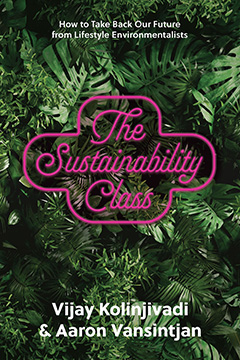
By Vijay Kolinjivadi and Aaron Vansintjan
A sustainability apartheid is emerging. More than ever, urban residents want to be green, yet to cater to their interests, a green-tech service economy has sprung up, co-opting well-intentioned concerns over sustainability to sell a resource-heavy and exclusive “lifestyle environmentalism.” This has made cities more unsustainable and inaccessible to the working class.
The Sustainability Class is about those wealthy “progressive” urbanites convinced that we can save the planet through individual action, smart urbanism, green finance, and technological innovation. Challenging many of the popular ideas about environmentalism, authors Vijay Kolinjivadi and Aaron Vansintjan show that it is actually the sustainability class that is unsustainable, its solutions working to safeguard an elite minority, exclude billions of people, and ultimately hasten ecological breakdown, not reverse it.
From Venice Beach, Los Angeles, to Neom in Saudi Arabia and beyond, the authors explore with biting humor how investors around the world are rushing to capitalize on going green. By contrast, real-world examples of movements for housing and food production, transport, and waste management demonstrate how ordinary people around the world are building a more ecological future by working together, against all odds. In doing so, they show us how sustainability can be reclaimed for everyone. Sustainability isn’t about vibes and superficial green facades. It’s about building people power to reimagine the world.
Out of Sight The Long and Disturbing Story of Corporations Outsourcing Catastrophe
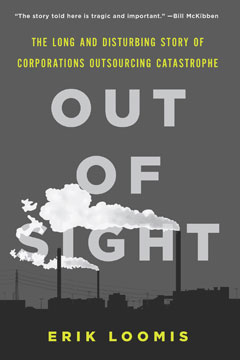
By Erik Loomis
When jobs can move anywhere in the world, bosses have no incentive to protect either their workers or the environment. Work moves seamlessly across national boundaries, yet the laws that protect us from rapacious behavior remain tied to national governments. This situation creates an all-too-familiar “race to the bottom,” where profit is generated on the backs of workers and at the cost of toxic pollution.
In Out of Sight, Erik Loomis—a historian of both the labor and environmental movements—follows the thread that runs from the Triangle Shirtwaist Factory fire in New York in 1911 to the collapse of the Rana Plaza factory building outside of Dhaka, Bangladesh, in 2013. The truth is that our systems of industrial production today are just as dirty and abusive as they were during the depths of the industrial revolution and the Gilded Age, but the ugly side of manufacturing is now hidden in faraway places where workers are most vulnerable.
Today, American capitalists threaten that any environmental regulations will drive up the cost of production and force them to relocate our jobs to a country where they don’t face such laws and can re-create their toxic work conditions. It wasn’t always like this. In his insightful book, Loomis shows that the great environmental victories of twentieth-century America—the Clean Water Act, the Clean Air Act, the EPA—were actually union victories. This history is a call to action: when we fight for our planet, we fight for our own dignity as workers and citizens. Out of Sight calls upon us to fight for regulations that follow corporations wherever they do business and put the power back in workers’ hands.
